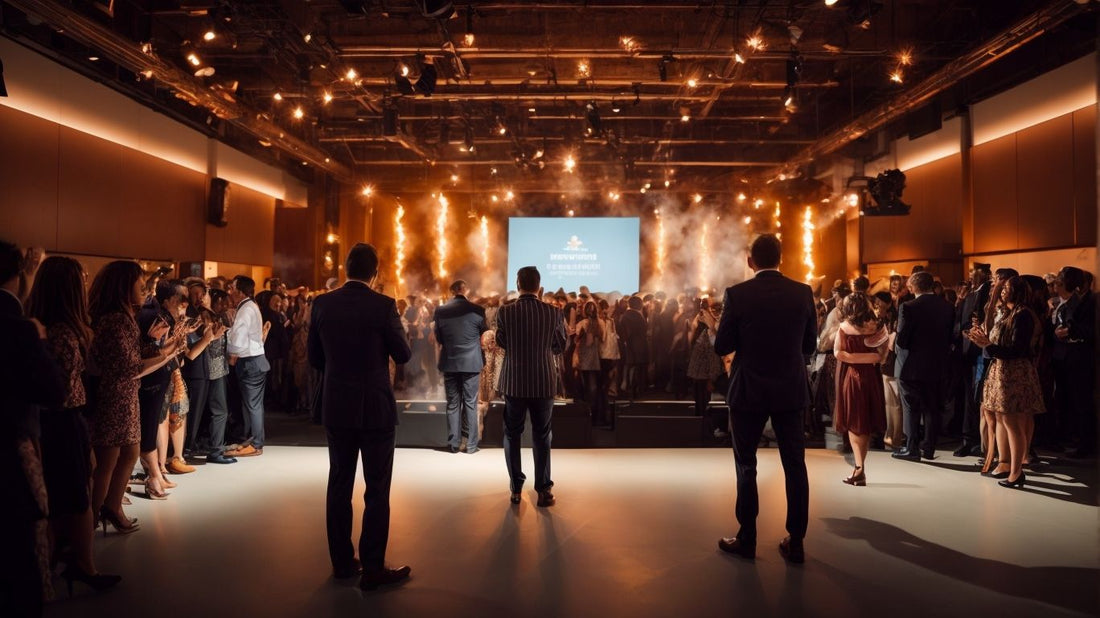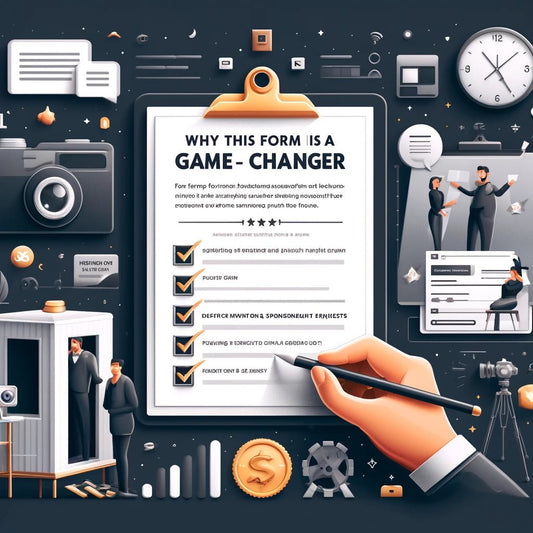
Unleash Creativity & Success: Top 10 Innovative Corporate Event Ideas
Share
.jpg)
Corporate events play a crucial role in the business world, serving as platforms for networking, team-building, professional development, and brand promotion. When planning a corporate event, there are several factors to consider to ensure its success. These factors include budget and funding, event objectives and goals, target audience, theme and concept, venue selection, and event schedule and timeline.
There are various popular corporate event ideas that can cater to different goals and interests within an organization. These ideas include team-building activities, professional development workshops, networking events, awards ceremonies, charity events, and product launches.
To stay up-to-date and make an impact, it's essential to be aware of the latest trends and innovations in corporate events. This includes incorporating virtual and hybrid event elements, integrating experiential and interactive elements, and adopting sustainable and eco-friendly practices.
Effective planning and execution are crucial for the success of corporate events. This involves creating a detailed event plan, collaborating with event vendors and suppliers, and implementing effective marketing and promotion strategies to ensure maximum participation and engagement.
Lastly, measuring the success and evaluating the outcomes of corporate events is essential for continuous improvement. This involves analyzing key performance indicators, attendee feedback, and the achievement of event objectives to gauge the event's impact and make informed decisions for future events.
By understanding the importance of corporate events, considering key factors in event planning, exploring popular event ideas, and staying updated on trends and best practices, organizations can create meaningful and impactful corporate events that leave a lasting impression on attendees.
Why Are Corporate Events Important?
Corporate events are important for several reasons. Why are corporate events important? They offer an opportunity for employees to connect and build relationships, fostering a sense of teamwork and camaraderie. These events also provide a platform for employees to showcase their skills and talents, boosting morale and motivation. Corporate events allow for important announcements and updates to be shared, ensuring that everyone is on the same page. They can serve as a platform for professional development, with workshops and speakers offering valuable insights and training. Corporate events play a crucial role in strengthening company culture, improving employee engagement, and driving success.
Factors to Consider When Planning Corporate Events
When it comes to planning corporate events, there are several factors that need to be carefully considered. From budget and funding to event objectives and goals, target audience, theme and concept, venue selection, and event schedule and timeline - each aspect plays a crucial role in creating a successful and memorable event. By exploring these key factors, we can ensure that the event not only meets the organization's goals but also engages attendees in a unique and impactful way. So, let's dive into the essentials of planning corporate events and uncover the secrets to hosting an event that leaves a lasting impression.Budget and Funding
A well-planned budget is crucial for the successful execution of corporate events, ensuring that all necessary expenses are covered. Below is a table highlighting key aspects to consider when budgeting for such events:
| Budget and Funding |
|---|
| Venue rental |
| Food and beverages |
| Audiovisual equipment |
| Staff and vendors |
| Marketing and promotion |
| Decorations and signage |
| Insurance and permits |
| Miscellaneous expenses |
By accurately estimating costs for each category, event planners can allocate resources efficiently and identify potential areas for cost-saving. Adequate funding can be secured by seeking sponsorships, ticket sales, or company allocations. Successful management of budget and funding is essential for delivering memorable and impactful corporate events.
Event Objectives and Goals
Setting clear event objectives and goals is crucial for successful planning and execution. When outlining your event objectives and goals, consider the following key factors:
Define purpose: Clearly state the purpose of the event, whether it is to educate, motivate, or celebrate achievements, in order to set clear event objectives and goals.
Identify target audience: Determine the specific group you are targeting, such as employees, clients, or industry professionals, to ensure that your event objectives and goals are tailored to their needs.
Establish measurable goals: Set specific and achievable goals that align with the purpose of the event, such as increasing brand awareness or generating leads, as part of your event objectives and goals.
Choose key performance indicators (KPIs): Identify metrics that will help you assess the success of your event, such as attendee satisfaction, sales conversions, or social media engagement, and incorporate them into your event objectives and goals.
Create a timeline: Develop a timeline that outlines when each objective should be accomplished, ensuring a structured and organized planning process for your event objectives and goals.
By clearly defining event objectives and goals, you can create an impactful corporate event that meets the needs and expectations of your target audience.
Target Audience
Knowing your target audience is crucial when planning corporate events. Consider the following factors to ensure your event caters to their needs and interests:- Demographics: Understand the age, gender, occupation, and other relevant characteristics of your target audience.
- Preferences: Research their interests, hobbies, and preferences to design activities and themes that appeal to them.
- Goals and objectives: Determine the objectives of your event and align them with the goals and desires of your target audience.
- Communication channels: Identify the most effective ways to reach and engage your target audience, whether it's through social media, email marketing, or professional networks.
Theme and Concept
When planning corporate events, the selection of an appropriate theme and concept plays a vital role in creating an unforgettable and captivating experience for participants. The theme sets the ambiance and atmosphere of the event, while the concept establishes the overarching idea or objective behind it. While choosing a theme, it is important to consider the target audience, event goals, and the desired atmosphere. For instance, a technology-focused theme would be suitable for a tech conference, while a beach-themed concept would be perfect for a summer networking event. A well-executed theme and concept have the potential to improve branding, increase attendee engagement, and contribute to the overall success of the corporate event.
Venue Selection
When selecting a venue for a corporate event, venue selection becomes crucial to ensure its success. Several factors should be considered to ensure that the chosen venue meets all the necessary requirements. Capacity should be a top consideration, making sure that the venue can accommodate the anticipated number of attendees. Location is another important factor, as it is preferred to opt for a venue that is easily accessible for all participants and offers ample parking or public transportation options. Amenities should also be taken into account, including facilities such as audiovisual equipment, seating arrangements, and catering services that align with the event requirements. Additionally, ambiance is essential as the venue's atmosphere should complement the event's theme or purpose, creating a memorable experience for all attendees. Lastly, cost evaluation should also be conducted to ensure that the venue's pricing structure fits within the allocated budget.
Event Schedule and Timeline
The event schedule and timeline are essential components of organizing and carrying out a prosperous corporate event. They play a crucial role in ensuring that all necessary tasks and activities are completed within the specified timeframe, guaranteeing the smooth running of the event on the designated day. Here is a comprehensive breakdown of the event schedule and timeline:
| 1. Pre-event preparations: | - Start by determining the event date and time. | - Establish deadlines for various tasks, including venue booking, vendor selection, and budget allocation. | - Develop a detailed event plan that outlines the sequence of activities leading up to the event. |
| 2. Event day timeline: | - Clearly define the starting and ending times of the event. | - Allocate specific time slots for different activities such as registration, keynote speeches, panel discussions, and networking sessions. | |
| 3. Internal coordination: | - Effectively communicate the event schedule and timeline to all stakeholders, including internal teams, vendors, and sponsors. | - Conduct regular meetings and check-ins to ensure that everyone is aligned and on track with the schedule. | |
| 4. Contingency planning: | - Anticipate potential delays or issues that may arise during the event. | - Incorporate buffer time into the schedule to accommodate any unforeseen circumstances. |
By carefully planning and adhering to the event schedule and timeline, organizers can ensure the successful and timely execution of all aspects of the corporate event. This ultimately leads to a memorable and impactful experience for all attendees.
Popular Corporate Event Ideas
Looking to plan your next corporate event? We've got you covered with a wide range of popular ideas that are sure to impress. From team-building activities that foster collaboration and improve communication to professional development workshops that enhance skills and knowledge, there is something for everyone. Elevate networking opportunities with engaging events, celebrate achievements with glitzy awards ceremonies, make a positive impact with charity events, and wow the crowd with unforgettable product launches. Get ready to create a memorable experience for your team and clients alike!Team-Building Activities
Planning team-building activities for corporate events is crucial for fostering collaboration, boosting morale, and enhancing employee engagement. Team-building activities can vary depending on the company culture and objectives, but their main purpose should always be to promote teamwork and improve communication. Some popular team-building activities include:
- Outdoor adventures like hiking or obstacle courses
- Escape room challenges to encourage problem-solving skills
- Cooking or baking competitions to promote collaboration
- Team sports or friendly competitions to build camaraderie
- Interactive workshops focused on improving communication and leadership skills
Remember to carefully select team-building activities that align with the goals of the corporate event and create a inclusive and enjoyable experience for all employees.
Professional Development Workshops
Professional development workshops are an essential component of corporate events, providing valuable opportunities for employees to enhance their skills and knowledge in specific areas. These workshops, focused on professional development, cover various topics such as leadership, communication, and project management.
One of the key benefits of professional development workshops is continuous learning. These workshops serve as a platform for employees to acquire new skills and stay updated with industry trends, contributing to their professional growth and development.
Employees who attend professional development workshops can experience enhanced productivity. By mastering new techniques and strategies, they can increase their efficiency and effectiveness in the workplace, leading to improved output and performance.
Another advantage of participating in professional development workshops is the opportunity it provides for career advancement. These workshops equip employees with the necessary skills to take on new responsibilities and challenges, enabling them to progress in their careers and reach their professional goals.
Additionally, professional development workshops offer networking opportunities. Employees have the chance to interact with industry experts and peers during these workshops, fostering valuable connections and expanding their professional network.
Professional development workshops play a vital role in nurturing the growth and development of employees, contributing to a more skilled and competent workforce. Suggestions for professional development workshops may include topics such as time management, effective communication, or digital marketing strategies.
Networking Events
Networking events are a crucial aspect of corporate events, serving as a vital platform for connecting professionals and nurturing valuable business relationships. These events offer attendees the opportunity to expand their network, share knowledge, and explore potential collaboration prospects. When organizing networking events, it is important for planners to consider the following factors:
<ul>
Awards Ceremonies
Awards ceremonies are a crucial aspect of corporate events, serving as an opportunity to recognize and celebrate excellence and achievements within a company. When planning an awards ceremony, it is important to consider the following factors:
- Objective: It is essential to clearly define the purpose of the awards ceremony, whether it is to motivate employees, recognize outstanding performance, or enhance company culture.
- Categories: Determine the types of awards to be presented, such as Employee of the Year, Innovation Award, or Team Accomplishment.
- Nomination and Selection Process: Establish a fair and transparent method for accepting nominations and selecting winners, involving a committee or online voting system.
- Venue and Decor: Choose an appropriate venue that aligns with the significance of the event and decorate it accordingly to create a celebratory atmosphere.
- Presenters: Identify presenters who can add prestige to the awards ceremony, such as company executives or industry leaders.
- Entertainment: Consider incorporating live performances, music, or guest speakers to keep attendees engaged and entertained during the awards ceremony.
- Timing and Schedule: Develop a detailed timeline to ensure a smooth flow of the awards ceremony and avoid any delays.
- Recognition and Trophies: Select high-quality trophies or prizes that reflect the significance of the awards and create a sense of pride for the recipients.
- Speeches and Acceptance: Plan for brief acceptance speeches and provide guidance to winners to ensure their speeches are concise, heartfelt, and inclusive.
- Documentation and Promotion: Capture the highlights of the awards ceremony through professional photography and videography to create lasting memories, and promote the event on company social media platforms.
Charity Events
Charity events are a popular choice for corporate events due to their positive impact on the community and the opportunity for companies to showcase their philanthropic efforts. When planning a charity event, consider factors like the cause alignment with your company values, the target audience's interests, and the logistics of organizing the event. Popular charity event ideas include fundraisers, volunteer activities, and auctions. Incorporating unique and engaging elements, such as guest speakers or celebrity endorsements, can help maximize attendance and donations. Fact: Charity events not only benefit the community, but they also enhance a company's reputation and employee engagement.
Product Launches
Product launches are crucial events for businesses to introduce new products to the market and generate buzz. To successfully plan a product launch, businesses should consider various factors:
- Timing: Choose a date and time for the product launch that aligns with when the target audience is most likely to pay attention and engage.
- Theme: Develop a compelling theme that effectively conveys the message and essence of the product and brand.
- Invitations: Personalize the invitations to create anticipation and excitement among the recipients.
- Venue: Carefully select a venue that reflects the image and values of the product, thus creating an ideal setting.
- Media coverage: Devise a comprehensive media strategy that ensures extensive coverage and the generation of impactful press releases.
- Product demonstration: Highlight the features and benefits of the product by engaging the audience through interactive demonstrations.
- Guest experience: Make sure to curate a memorable experience for attendees, offering engaging activities and valuable giveaways.
By thoughtfully considering all these elements, businesses can successfully launch their products, making a lasting impact on their target audience.
Trends and Innovations in Corporate Events
Get ready to discover the latest trends and exciting innovations in the world of corporate events! From virtual and hybrid experiences to experiential and interactive elements, and sustainable practices, this section is a treasure trove of inspiration. Uncover how companies are embracing new technologies to create engaging virtual events, explore the power of interactive elements that make corporate gatherings unforgettable, and learn about the growing focus on sustainability in the event industry. Get ready to be amazed by the possibilities that await in the world of corporate event planning!Virtual and Hybrid Events
Virtual and hybrid events have gained significant popularity in the corporate world due to their flexibility, accessibility, and cost-effectiveness. When planning virtual and hybrid events, it is crucial to consider the following key factors:
- Technology: Make sure to have a reliable internet connection and select a virtual platform that suits the size and objectives of your event.
- Engagement: Enhance participant engagement by incorporating interactive elements such as live polls, Q&A sessions, and networking opportunities.
- Content Delivery: Optimize your content for online consumption by keeping it concise, visually appealing, and presenting it in bite-sized formats.
- Accessibility: Ensure that all participants can access the event by providing closed captioning and translation services if needed.
- Networking Opportunities: Facilitate meaningful connections by offering virtual breakout rooms, networking lounges, or one-on-one video chats.
By considering these factors, companies can effectively plan and execute virtual and hybrid events that offer a valuable and engaging experience for all participants.
Experiential and Interactive Elements
Experiential and interactive elements are essential considerations when organizing corporate events as they effectively enhance attendee engagement and create lasting and impactful experiences. Here are some innovative ideas to seamlessly incorporate these elements into your event:
Sustainable and Eco-Friendly Practices
To ensure sustainability and promote eco-friendly practices in corporate events, it is important to incorporate the following sustainable and eco-friendly measures:
- Reduce waste: Encourage the use of electronic invitations, make use of digital signage, and provide reusable or compostable materials.
- Limit energy consumption: Opt for energy-efficient lighting options, maximize the use of natural lighting whenever possible, and implement smart temperature controls to conserve energy.
- Promote recycling: Set up designated recycling stations, offer recycling bins, and educate participants on proper recycling practices to encourage recycling.
- Sustainable catering: Choose locally sourced, organic, and seasonal food options to support sustainability. Avoid the use of single-use plastics and prioritize the use of compostable or biodegradable dinnerware.
- Transportation: Encourage attendees to carpool, use public transportation, or provide shuttle services to reduce carbon emissions. Additionally, consider participating in carbon offset programs to offset any remaining emissions.
- Engage in community initiatives: Partner with local sustainability organizations, incorporate charitable components into the event, and support local businesses to contribute to the community's sustainability efforts.
Planning and Execution of Corporate Events
Looking to organize a corporate event that leaves a lasting impression? In this section, we'll dive into the ins and outs of planning and executing successful corporate events. From creating a detailed event plan to collaborating with event vendors and suppliers, and even exploring marketing and promotion strategies, we've got you covered. Get ready to bring your vision to life, captivate attendees, and achieve your goals with flair. Let's delve into the world of corporate event planning and make your next gathering unforgettable.Creating a Detailed Event Plan
Creating a Detailed Event Plan is imperative for the triumph of any corporate event. It guarantees that all elements of the occasion are meticulously considered and executed. Here are the crucial steps to ponder upon when devising a thorough event plan:
Collaborating with Event Vendors and Suppliers
Collaborating with event vendors and suppliers is essential for the success of corporate events. Here are some key points to consider when working with them:
- Research and vet potential vendors and suppliers to ensure they have the experience and capabilities to meet your event needs.
- Clearly communicate your event requirements, budget, and timeline to avoid any misunderstandings.
- Establish a strong working relationship by maintaining open and regular communication throughout the planning process.
- Negotiate contracts and agreements that clearly outline deliverables, pricing, and terms to protect both parties.
- Regularly review and evaluate the performance of vendors and suppliers to ensure they meet expectations.
Remember, effective collaboration with event vendors and suppliers is crucial for a seamless and successful corporate event.
Marketing and Promotion of Corporate Events
When planning and organizing corporate events, marketing and promotion strategies play a crucial role in ensuring the success and attendance of the event. Here are some key tactics to consider for the marketing and promotion of corporate events:
- Create a comprehensive marketing plan that incorporates a mix of online and offline promotion to effectively reach the target audience.
- Utilize social media platforms to generate buzz and actively engage with the target audience, thereby creating a strong online presence.
- Collaborate with influencers or industry leaders who can endorse and promote the event, helping to build credibility and increase visibility.
- Implement email marketing campaigns to reach out to potential attendees and keep them informed about the event details, ensuring they stay engaged.
- Design visually appealing promotional materials, such as banners, posters, and brochures, that capture the attention of the target audience.
- Make use of event listing platforms and directories to increase visibility and attract a wider audience, maximizing the event's reach.
- Explore partnership opportunities with relevant businesses or organizations to cross-promote the event, increasing exposure and expanding the attendee base.
By effectively marketing and promoting corporate events, you can significantly boost attendance, generate excitement, and guarantee the overall success of the event.
Measuring Success and Evaluating Corporate Events
Measuring the success of corporate events is essential to assess their effectiveness and make improvements. Here are some key factors to consider when evaluating corporate events:
- Set measurable goals before the event, such as attendance numbers, participant engagement, or lead generation.
- Collect feedback from attendees through surveys or interviews to gauge their satisfaction and identify areas for improvement.
- Analyze key performance indicators (KPIs) like return on investment (ROI), event cost, and revenue generated.
- Examine social media engagement and sentiment to understand the event's impact on brand awareness and reputation.
- Assess the event's alignment with the company's overall objectives and whether it met the desired outcomes.
To measure the success and evaluate corporate events effectively, it is important to consider these key factors.
To improve future events, consider these suggestions:
- Implement changes based on feedback to address any shortcomings and enhance attendee experience.
- Utilize event technology tools to track data and automate processes for more accurate measurement and evaluation.
- Continuously monitor metrics and evaluate trends across multiple events to identify best practices and areas for growth.
- Seek input from stakeholders and other departments to gain a holistic perspective on the event's success.
Frequently Asked Questions
1. Can you provide some fun corporate event ideas that will help break the normal work routine and engage team members?
Yes! Here are a few unique ideas:
- Organize a virtual reality scavenger hunt where employees can participate from their desks or in person.
- Host a karaoke lunch battle with live backing tracks provided by a band.
- Plan an Everything-New Day where team members participate in activities they've never tried before to learn and grow together.
- Consider escape rooms, which are popular choices for team-building events.
2. How can I show appreciation to my employees beyond just Employee Appreciation Day?
There are several creative ways to appreciate your employees throughout the year. Some ideas include:
- Setting up an ice cream bar or providing a special treat for a "Day of Thanks" to show gratitude.
- Organizing special family fun days where employees can invite their loved ones to enjoy entertainment sponsored by the company.
- Implementing a "Bring Your Pet to Work Day" to create a fun and memorable experience for employees.
3. How can corporate events contribute to building team spirit and enhancing employee engagement?
Corporate events provide the opportunity for employees to socialize with peers and strengthen their sense of belonging within the organization. By participating in team-building activities and fun experiences outside the office, team members can connect on a personal level and build trust. This ultimately leads to increased employee engagement and a more engaged and cohesive team.
4. What are some work social event ideas that can promote team spirit and unity?
Here are a few work social event ideas that can bring employees together and foster team spirit:
- Organize themed spirit weeks where employees can engage in activities that promote team spirit and company pride.
- Consider hosting a casino night or poker tournament for a fun and interactive team-building activity.
- Encourage office decorating contests during holidays or special occasions to create a lively company culture.
5. Are there any corporate event ideas specifically tailored for different group sizes?
Absolutely! There are corporate event ideas suitable for both big and small groups. For large groups, you can consider:
- Organizing team retreats at resorts, convention centers, or chosen cities to deepen team dynamics.
- Planning family fun days where employees' families, friends, and non-traditional families can participate.
For small groups, you can focus on creating intimate offsite events or activities that allow for closer connections and collaboration.
6. How can I incorporate virtual elements into corporate events?
Virtual corporate events have gained popularity and offer unique opportunities to engage employees. Some ideas include:
- Organize virtual reality scavenger hunts or team-building activities that can be played remotely.
- Host live streaming sessions with industry experts for educational purposes and to foster critical thinking.
- Consider virtual team-building activities such as online escape rooms or virtual team challenges.






